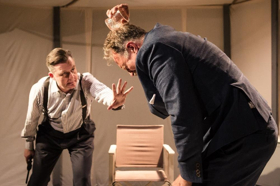Review: BUT IT STILL GOES ON, Finborough Theatre

![]() To present the world premiere of a re-discovered play written by Great War veteran and poet Robert Graves in the centenary year of the First World War is something of a coup for the tiny Finborough Theatre. But It Still Goes On is an exploration of familial and romantic relationships played out in a society still reeling from the effects of the war. It features lust, infidelity, repressed homosexuality and mental illness.
To present the world premiere of a re-discovered play written by Great War veteran and poet Robert Graves in the centenary year of the First World War is something of a coup for the tiny Finborough Theatre. But It Still Goes On is an exploration of familial and romantic relationships played out in a society still reeling from the effects of the war. It features lust, infidelity, repressed homosexuality and mental illness.
In 1932, Dick and Dorothy are living under the shadow of their irrepressible and lascivious father Cecil; Dick loves Charlotte and Dorothy loves David, but both are left struggling with Charlotte and David's hidden sexuality. This inevitably leads to heartbreak and tragedy for all.
The theatre's description cites the play as being influenced by the drawing room comedies of Noël Coward and W. Somerset Maugham, but unfortunately this is not in evidence. There is no comedy or sharp observation to counteract the dark content and any attempts by Graves for characters to display waspish humour fall flat. Graves' message is not subtle or nuanced; society is broken after the war, people are generally appalling and even the horrors that the war produced were not enough to allow people to be able to love who they choose.
Despite the dramatic content and the best efforts of the cast, Graves has written a play that lacks depth and real soul. It is almost impossible to become drawn in by the play and feel sympathy with any character, except perhaps David. He is a decent man, traumatised by his experiences in the war and is now trying to make the best of a difficult situation. It is clear that he is desperate not to hurt anyone as he deals with his homosexuality in the only way he knows how.
Every other character is either unlikeable or exasperating in varying degrees. In contrast to David, his friend Dick is unbearable; despairing of the world, bombastic and rude. A successful writer, he feels overshadowed by his more successful father and hates him so much that he is willing to construct a feud between his father and another poet that risks injury, if not death to his father. His sister Dorothy has the kudos of being a doctor, but comes across as both naïve and stupid. Father Cecil is a blustering, verbose and lecherous old man. Friend Charlotte is simultaneously self-destructive and one-dimensional and her sister Jane is annoyingly blasé about life and death.
An overall strong cast is undermined by this challenging material. Alan Cox delivers lines smoothly and often passionately, but lacks any real emotion at the tragic events that unfold. Victor Gardener is very good as David; a man haunted by the legacy of the war, he maintains his Officer stance throughout. Sophie Ward is quiet and a little too composed as tragic Charlotte and Jack Klaff channels Brian Blessed as he bellows his lines as vile father Cecil. He has a good presence on stage and is commanding in any scene he is in.
Directing in such a small space always presents challenges. Director Fidelis Morgan uses various dance routines to punctuate scene changes, but these are oddly placed and often look cramped. However, the placing of a spectre of a ghostly young soldier in certain scenes, played with sombre stillness by Joshua Ward, is haunting and effective.
What does work very well is Lindsay Hill's styling and costume design. Suits are sharp and double-breasted, evening dresses are slinky and elegant and hair is pin curled to perfection.
The Finborough Theatre prides itself on producing work that has not been seen in London for the past 25 years. This strategy has often produced veritable gems in the past, but sadly, this production is not one of them.
And So It Goes On is at the Finborough Theatre until 4 August
Photo Credit: Scott Rylander
Reader Reviews

Videos

